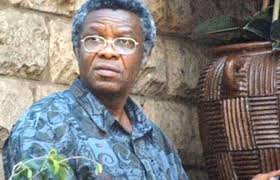

France’s top appeals court ruled on Wednesday that alleged Rwandan genocide financier Felicien Kabuga be transferred to a United Nations tribunal in Tanzania to stand trial on charges of genocide and crimes against humanity.
UN prosecutors accuse the former tea and coffee tycoon of bankrolling and importing huge numbers of machetes for ethnic Hutu fighters that killed hundreds of thousands of Tutsis and moderate Hutus in Rwanda during a 100-day period in 1994.
He was also accused of establishing the Radio Television Mille Collines station that broadcast vicious propaganda against the ethnic Tutsi minority, as well as training and equipping an armed group that led the killing spree.
Kabuga was close to former President Juvenal Habyarimana, whose death when his plane was shot down over Kigali sparked the 100-day genocide. Kabuga’s daughter married Habyarimana’s son.
Kabuga’s arrest in Paris in May ended a manhunt lasting more than 20 years. He has denounced the charges, including genocide and incitement to commit genocide, as ‘lies’.
His lawyers said at 87 he was too frail to be transferred abroad, especially during a dangerous coronavirus pandemic. The French courts list his age as 84.
Kabuga’s legal team also argued that French law violated the constitution by failing to allow for a thorough examination of international arrest warrants.
In June, a French court ruled Kabuga should stand trial at the Mechanism for International Criminal Tribunals (MICT) in Tanzania, which took over the duties of the UN’s International Criminal Tribunal for Rwanda (ICTR) when it formally closed in 2015.
Kabuga’s lawyers appealed that decision, citing what they said was his frail health and fears the UN tribunal would be biased.
But the Cour de Cassation, France’s highest appeals court for criminal cases, disagreed on Wednesday, meaning France will have a month to hand Kabuga over to the MICT.
Until his arrest, Kabuga had been the most high-profile fugitive still sought by the UN tribunal.
more recommended stories
 New Director Appointed: Burao Hospital’s Fall and the Fight for Revival
New Director Appointed: Burao Hospital’s Fall and the Fight for RevivalBurao Hospital begins a new chapter.
 Somaliland: While Mogadishu Burns, Somalia Seeks Chaos in Sool
Somaliland: While Mogadishu Burns, Somalia Seeks Chaos in SoolHargeisa, April 9, 2025 – (Somaliland.com).
 Somaliland Presidency Delivers 10 Vital Dialysis Machines to Hargeisa Group Hospital
Somaliland Presidency Delivers 10 Vital Dialysis Machines to Hargeisa Group HospitalHargeisa – Somaliland – The President.
 Electricity Without Accountability: Public Outrage Grows in Burao Electricity Debate
Electricity Without Accountability: Public Outrage Grows in Burao Electricity DebateHigh electricity costs in Burao have.

